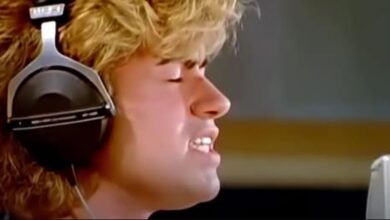This is the song that, according to Priscilla, Elvis pours all his heart out in its performance
Elvis Presley’s performance of “If I Can Dream” stands as one of his most poignant and memorable moments, captured during his ’68 Comeback Special. Recorded on June 23, 1968, this song is a testament to Presley’s ability to channel the emotional and social currents of his time into his music.
Written by Walter Earl Brown, “If I Can Dream” emerged as a response to the tumultuous period of the late 1960s, a time marked by significant social upheaval, civil rights struggles, and widespread disillusionment. The song’s lyrics reflect a deep yearning for a better world—a world where unity and peace could prevail despite the prevailing chaos and division. The opening lines set the tone with a sense of urgency and hope: “We’re lost in a cloud, with too much rain / We’re trapped in a world, that’s troubled with pain.”
The arrangement of the song is grand and uplifting, featuring a powerful gospel choir and a full orchestra that underscore the emotional weight of Presley’s performance. The choir’s rich harmonies and the orchestral backing elevate the song, creating a stirring and resonant backdrop for Presley’s passionate delivery. This musical arrangement, combined with Presley’s heartfelt vocals, amplifies the song’s message of hope and redemption.
Elvis’s performance of “If I Can Dream” was a significant departure from his earlier work, marking a return to his roots and a reinvigoration of his career. The ’68 Comeback Special was pivotal for Presley, symbolizing his return to live performance after a period of focusing primarily on his film career. The special was a critical and commercial success, and “If I Can Dream” became a centerpiece of the show, showcasing Presley’s powerful voice and his ability to convey deep emotional and social themes.
The song’s message of hope and unity was particularly resonant in the context of the civil rights movement, which was at its height during the late 1960s. Presley’s impassioned performance and the song’s optimistic lyrics provided a counterpoint to the prevailing sense of despair and division. The line “But as long as a man has the strength to dream / He can redeem his soul and fly” encapsulates the core message of the song: that hope and dreams can offer a path to personal and collective redemption.
“If I Can Dream” has since become an enduring part of Elvis Presley’s legacy, remembered for its powerful message and stirring performance. The song continues to be celebrated for its inspirational content and its reflection of a critical moment in American history. Presley’s ability to infuse his music with a sense of purpose and relevance remains a defining feature of his career.
Elvis Presley’s influence on music and culture extends far beyond his groundbreaking performances and recordings. His ability to connect with audiences on an emotional level, combined with his dedication to addressing contemporary issues through his music, has solidified his place as an iconic figure in music history. “If I Can Dream” serves as a powerful reminder of Presley’s impact and his enduring relevance as an artist who could capture the spirit of his times.





